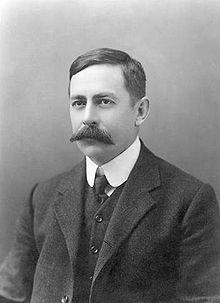Littleton Groom
|
The Honourable Sir Littleton Groom KCMG KC |
|
|---|---|
 |
|
| Member of the Australian Parliament for Darling Downs |
|
|
In office 14 September 1901 – 12 October 1929 |
|
| Preceded by | William Henry Groom |
| Succeeded by | Arthur Morgan |
|
In office 19 December 1931 – 6 November 1936 |
|
| Preceded by | Arthur Morgan |
| Succeeded by | Arthur Fadden |
| 6th Speaker of the Australian House of Representatives | |
|
In office 13 January 1926 – 11 October 1929 |
|
| Preceded by | William Watt |
| Succeeded by | Norman Makin |
| Personal details | |
| Born |
22 April 1867 Toowoomba, Queensland |
| Died | 6 November 1936 (aged 69) Canberra |
| Nationality | Australian |
| Political party |
Protectionist (1901–09) Fusion (1909–17) Nationalist (1917–29) Independent (1929–33) UAP (1933–36) |
| Alma mater | University of Melbourne |
| Occupation | Lawyer |
Sir Littleton Ernest Groom, KCMG KC (22 April 1867 – 6 November 1936) was an Australian Federal Minister, Speaker of the House of Representatives and Australia's 17th longest serving federal Parliamentarian (33 years and one month). He was a member of every non-Australian Labor Party ministry from 1905 to 1926. He was a liberal protectionist, who believed in the extension of federal powers, but became increasingly opposed to the Australian Labor Party's socialist agenda.
Groom was born in Toowoomba, Queensland, third son of William Henry Groom and his wife Grace, née Littleton. Groom was educated at Toowoomba North State School, Toowoomba Grammar School, where he was dux of the school and captain of both the football and cricket teams, and Ormond College, University of Melbourne where he won the 1890 University Scholarship at the Final Honours Examination in Laws. Groom then worked as a lawyer, Crown Prosecutor and acting judge. Groom married Jessie Bell in July 1894.
Groom won the first federal by-election in Australian history, as a Protectionist for the seat of Darling Downs, caused by the death of his father William Henry Groom. Littleton Groom was a strong Australian nationalist, supporting an extension of the Commonwealth's powers, including its industrial relations powers. As a result, he supported the Watson government in 1904. Groom was Minister of Home Affairs from July 1905 to October 1906 in the second Deakin Ministry and introduced legislation in 1906 to create a federal meteorological department and the creation of the Commonwealth Council for Scientific and Industrial Research (CSIRO) in 1916 was in large part a product of his attempt to create an Australian Department of Agriculture in 1906. In October 1906, Groom became Attorney General until the defeat of the Deakin government in November 1908. Groom passed legislation to defend the Harvester Judgment and successfully introduced legislation providing Commonwealth invalid and old age pensions.
...
Wikipedia
